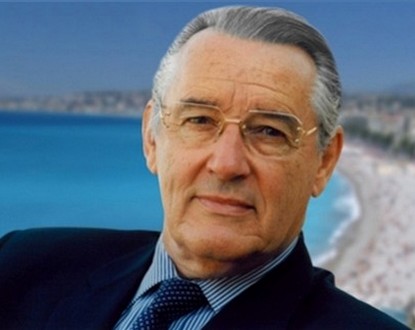As his competitors in the municipal election, Jacques Peyrat has begun illustrating his program to add substance and content to his candidacy.
With his campaign director Hervé de Surville by his side, he wanted to address the first section, which pertains to the themes that are most important to him: Security, cleanliness, and proximity, which are, in a certain way, intertwined.
There are no major surprises regarding the proposals, which confirm the usual orientation of the former mayor of Nice.
Concerning security, Jacques Peyrat confirmed that the violence in society, which is at the center of concern for a large part of the population, is primarily due to the economic crisis, which particularly marginalizes young people, and to massive immigration.
This is a recurring analysis among right-wing candidates, pushing them to propose an all-security approach: This is not the case for Jacques Peyrat who instead focuses on a contract of trust between the municipal police and the citizens, achieved through a constant and active presence in the territory: Local patrolling.
As for cleanliness, after criticizing the incivility of residents who are not exempt from responsibility—and sometimes quite the contrary—for Jacques Peyrat, the current situation, which he sees as largely unsatisfactory, is due to the delegation of cleaning services to the Metropolis (“a poorly conceived structure with a scope modeled on that of the 5th constituency, solely useful for Christian Estrosi’s re-election to the National Assembly,” he says). Consequently, according to the candidate, Nice “is loosening its grip to satisfy the mayors of small towns by sacrificing its own service quality.”
Finally, for proximity, the recipe would be in the formula of “4 districts,” an evolution from the 8 current territories that the former mayor implemented during his tenure. A similar proposition has already been presented by another candidate, Olivier Bettati. “I am glad he remembers my good lessons when I was mayor,” smiles Jacques Peyrat slyly, implying whom the idea truly belongs to.
The four districts would be managed by a council, under the authority of a deputy mayor, and composed of majority and opposition elected officials, neighborhood presidents, and associations.
A decentralized assembly with its own budget and administrative and technical staff (parks and gardens, local cleaning, minor maintenance work) and a municipal police brigade.
This is an opportunity for Jacques Peyrat to revive an idea dear to him: The transfer of the central town hall to Place du Général De Gaulle, transforming the current city hall into a district town hall for the city center and old town, which would be added to those of the east, west, and north.
Finally, significant objectives will be targeted in Jacques Peyrat’s action if he were to become mayor of Nice again: The modification of the Metropolis’s role, the Court of Appeal, a new location for the prison, and a modern central police station for the National Police.
However, beyond merely mentioning these issues, one will have to, of course, wait for the outcome of the ballots.


